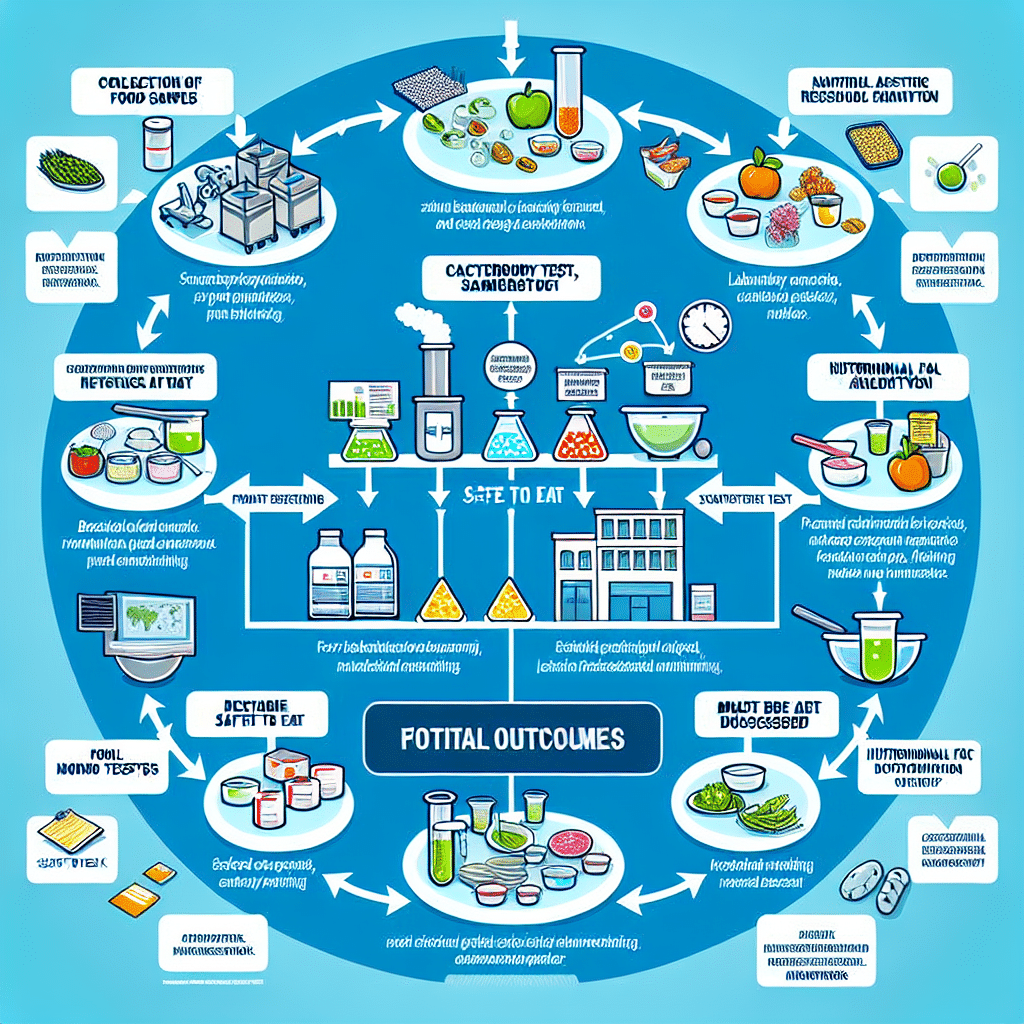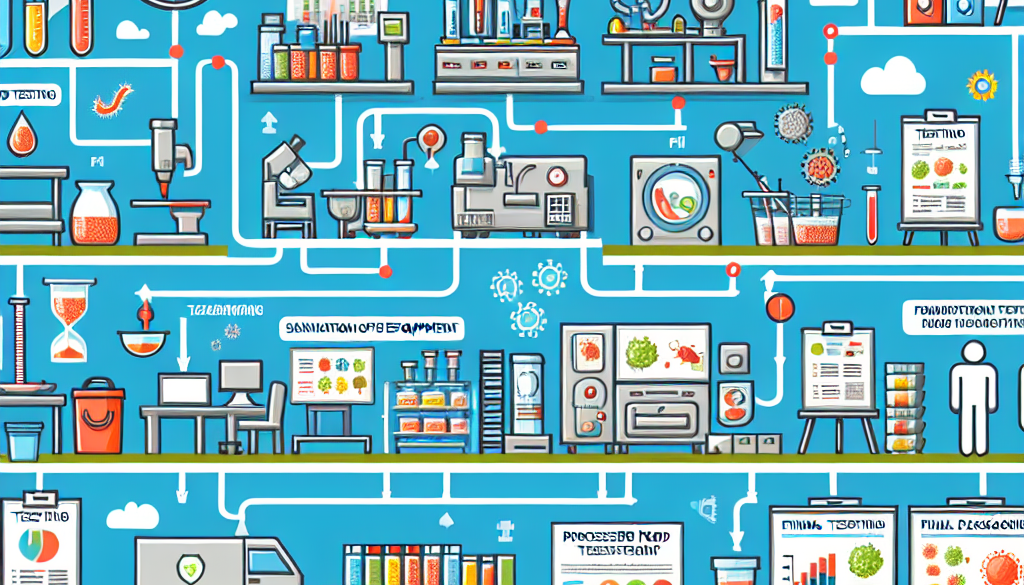Food Safety Testing: What You Need to Know
-
Table of Contents
- Food Safety Testing: Essential Insights and Practices
- Understanding Food Safety Testing
- The Importance of Food Safety Testing
- Key Methods in Food Safety Testing
- Regulations and Standards in Food Safety Testing
- Advancements in Food Safety Testing Technologies
- Challenges in Food Safety Testing
- Consumer Role in Food Safety
- Conclusion: The Critical Role of Food Safety Testing
- ETprotein: Your Partner in Quality Protein Products
Food Safety Testing: Essential Insights and Practices

Food safety testing is a critical component of the global food supply chain, ensuring that the food we consume is free from contaminants and safe for consumption. With the increasing complexity of food production and distribution, coupled with a rise in foodborne illnesses, the importance of food safety testing has never been more pronounced. This article delves into the intricacies of food safety testing, providing valuable insights into its necessity, methods, and regulations.
Understanding Food Safety Testing
Food safety testing encompasses a variety of procedures aimed at detecting harmful substances in food products. These substances can include pathogens like bacteria, viruses, and parasites, chemical contaminants such as pesticides and heavy metals, and allergens. The goal of food safety testing is not only to protect consumers from immediate health risks but also to prevent long-term effects that may arise from exposure to certain contaminants.
The Importance of Food Safety Testing
Foodborne illnesses are a significant public health concern. According to the Centers for Disease Control and Prevention (CDC), an estimated 48 million people get sick, 128,000 are hospitalized, and 3,000 die each year in the United States due to foodborne diseases. Food safety testing is crucial in reducing these numbers by identifying and mitigating risks before products reach the consumer.
Key Methods in Food Safety Testing
There are several methods used in food safety testing, each with its own advantages and applications:
- Microbiological Testing: This is used to detect pathogens such as Salmonella, E. coli, and Listeria. Techniques include culture-based tests, polymerase chain reaction (PCR), and enzyme-linked immunosorbent assay (ELISA).
- Chemical Testing: Employed to identify contaminants like pesticides, antibiotics, and mycotoxins. Methods include gas chromatography-mass spectrometry (GC-MS) and high-performance liquid chromatography (HPLC).
- Allergen Testing: Critical for detecting the presence of allergenic substances to prevent allergic reactions in sensitive individuals. Immunoassay methods such as ELISA are commonly used.
Regulations and Standards in Food Safety Testing
Food safety regulations vary by country but generally include standards set by international bodies such as the Codex Alimentarius Commission. In the United States, the Food and Drug Administration (FDA) and the United States Department of Agriculture (USDA) are the primary regulatory agencies overseeing food safety. The European Union has its own set of regulations enforced by the European Food Safety Authority (EFSA).
Advancements in Food Safety Testing Technologies
Technological advancements have led to more rapid and accurate food safety testing methods. Innovations such as next-generation sequencing (NGS) and biosensors are revolutionizing the field, allowing for quicker detection of contaminants and real-time monitoring of food safety.
Challenges in Food Safety Testing
Despite advancements, food safety testing faces several challenges, including:
- Complex global supply chains that complicate traceability
- Emerging pathogens and contaminants due to environmental changes
- The need for harmonization of food safety standards across different jurisdictions
Consumer Role in Food Safety
While food safety testing is primarily the responsibility of producers and regulators, consumers also play a vital role. Being informed about food recalls, understanding food labels, and practicing proper food handling can significantly reduce the risk of foodborne illnesses.
Conclusion: The Critical Role of Food Safety Testing
Food safety testing is an indispensable part of the food industry, safeguarding public health and maintaining consumer trust. As the industry evolves, continuous improvement in testing methods and regulations will be necessary to address the challenges posed by a dynamic global food system. By staying informed and vigilant, consumers, producers, and regulators can work together to ensure the safety of our food.
ETprotein: Your Partner in Quality Protein Products
In the context of food safety, protein products are no exception to the need for rigorous testing and quality assurance. ETprotein is a company that stands out in the industry for its commitment to producing high-quality protein products that meet the strictest safety standards.
ETprotein’s range of organic bulk vegan proteins, including rice protein, pea protein, and various seed proteins, are characterized by their neutral taste, non-GMO, and allergen-free attributes. Their L-(+)-Ergothioneine (EGT) products, available in various grades, boast a purity over 98%, ensuring that consumers receive the safest and most effective protein supplements.
Whether you’re a distributor, trader, or manufacturer in the food and beverage or nutraceutical industry, ETprotein offers comprehensive solutions to meet all your protein needs. With a reputation for excellence and trust from leading global brands, ETprotein is your go-to source for premium protein products.
About ETprotein:
ETprotein, a reputable protein and L-(+)-Ergothioneine (EGT) Chinese factory manufacturer and supplier, is renowned for producing, stocking, exporting, and delivering the highest quality organic bulk vegan proteins and L-(+)-Ergothioneine. They include Organic rice protein, clear rice protein, pea protein, clear pea protein, watermelon seed protein, pumpkin seed protein, sunflower seed protein, mung bean protein, peanut protein, and L-(+)-Ergothioneine EGT Pharmaceutical grade, L-(+)-Ergothioneine EGT food grade, L-(+)-Ergothioneine EGT cosmetic grade, L-(+)-Ergothioneine EGT reference grade and L-(+)-Ergothioneine EGT standard. Their offerings, characterized by a neutral taste, non-GMO, allergen-free attributes, with L-(+)-Ergothioneine purity over 98%, 99%, cater to a diverse range of industries. They serve nutraceutical, pharmaceutical, cosmeceutical, veterinary, as well as food and beverage finished product distributors, traders, and manufacturers across Europe, USA, Canada, Australia, Thailand, Japan, Korea, Brazil, and Chile, among others.
ETprotein specialization includes exporting and delivering tailor-made protein powder and finished nutritional supplements. Their extensive product range covers sectors like Food and Beverage, Sports Nutrition, Weight Management, Dietary Supplements, Health and Wellness Products, and Infant Formula, ensuring comprehensive solutions to meet all your protein needs.
As a trusted company by leading global food and beverage brands and Fortune 500 companies, ETprotein reinforces China’s reputation in the global arena. For more information or to sample their products, please contact them and email sales(at)ETprotein.com today.












